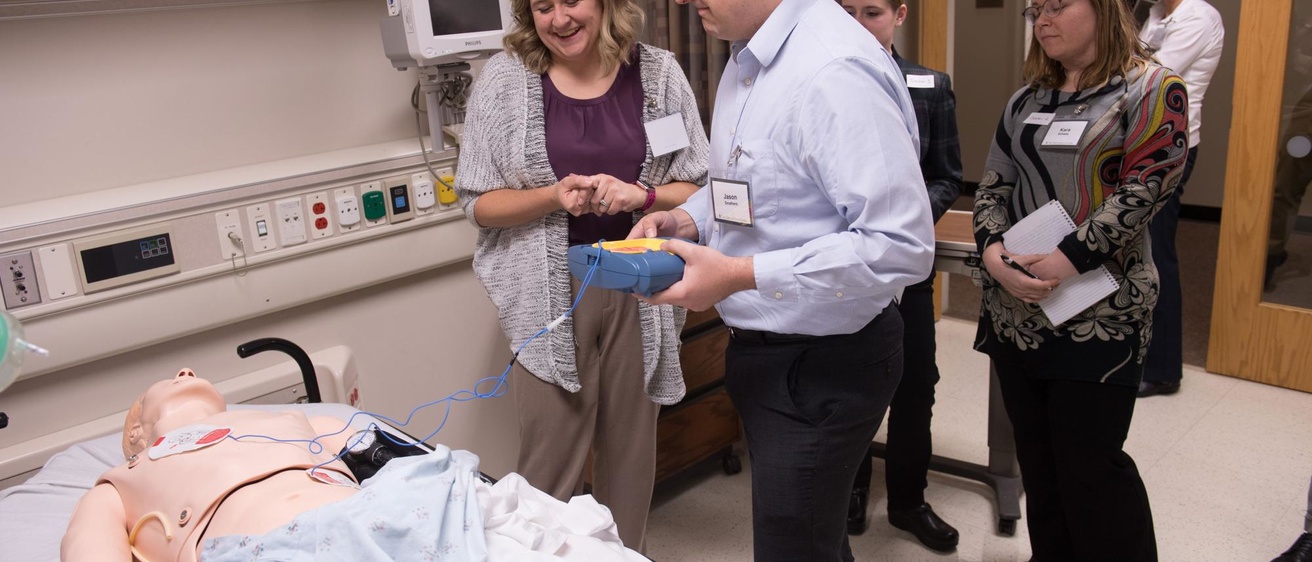Hayleigh Hansen spent a week at the University of Iowa Hospitals & Clinics over winter break.
The third-year College of Law student from Council Bluffs, Iowa, wasn’t sick, injured, or visiting a loved one. Instead, she was taking a unique week-long seminar designed to give law students a firsthand look at how legal issues intersect with the delivery of health care.
“I decided to take the class because I wanted to see health law from the client’s perspective,” Hansen says, referring to patients, providers, and health care institutions. “Between interning and the work I’ve done so far, I’ve only seen it from the legal perspective. I wanted to see that other point of view.”
For someone intending to practice health law after she graduates, getting to interact with patients and medical providers for a week was “absolutely invaluable,” Hansen says.
“I would honestly say this experience was the single-most practical learning experience I’ve had throughout my legal education,” she says. “You’re completely immersed for an entire week.”
The course was started and has been taught by Sheldon Kurtz since 1992. Kurtz, a professor in the UI College of Law, says the idea for the course came from a program offered by the Cleveland-Marshall College of Law at the Cleveland Clinic in Ohio. Kurtz spent two weeks going on rounds with physicians, seeing patients, and learning from clinic staff about the legal issues they face when providing health care.
“I was so intrigued with this experience that I came back and reached out to the College of Medicine about the possibility of us working together to put a mini version of this experience into play for Iowa law students,” says Kurtz, who also holds a zero-time appointment in the UI Roy J. and Lucille A. Carver College of Medicine. “The idea was to allow students to see the myriad legal problems that arise in the delivery of health care.”
Joining Kurtz in teaching the course is Anya Prince, an associate professor of law.
Students spend 40 to 45 hours a week at the university hospitals during the intensive course. Mornings are spent going on rounds with physicians. The nine students were assigned to a specific department in the hospital—neurology, internal medicine, pediatrics-neonatal intensive care, psychiatry, or palliative care. In the afternoon, the students attended various seminars hosted by medical professionals. Topics ranged from safety and processes in the health care setting to diversity and inclusion, informed consent and involuntary treatment, patient confidentiality, and end-of-life care.
Students also toured the Emergency Treatment Center, radiology facilities, and various surgical suites.
Kurtz describes health care as the most regulated profession in America and says he hopes his students gain an appreciation for that by the end of the week.
“I hope they walk away with an understanding of the complexity of medicine,” he says. “They know the law is complex, but I want them to understand the world is complex.”
The program wouldn’t be possible without the participation of the UI of Hospitals & Clinics, particularly the support of Carver College of Medicine’s Continuing Medical Education Division, Kurtz says.
Teresa Thomann, operations and compliance specialist with the Continuing Medical Education Division, says the division benefits from the class, as well. The winter seminar helps develop law students who could go on to become the next generation of health care legal team members or foster an interest in the field of health law.
“This is part of the educational mission for the Carver College of Medicine’s Continuing Medical Education Division,” Thomann says.
Kurtz says he isn’t aware of another course like this elsewhere in the country. The program at Cleveland Clinic on which he modeled UI’s no longer exists, he says.
“There was a big leap of faith for our medical colleagues to take when they heard, ‘We’re going to have some lawyers come over,’” Kurtz says. “But it’s worked out beautifully. We all love to teach.”
From a medical professional’s perspective, the course offers the opportunity to demystify topics in medicine, says Marcus Nashelsky, clinical professor of pathology. Nashelsky has been affiliated with the seminar since 2008.
“As a physician who often works with attorneys, I know that we should seize every opportunity to interact and learn more about the other’s profession,” Nashelsky says. “These seminars are informal, informative, and interactive. We have fun learning about each other. I take home as much as the law students do.”
As another student focused on health law, Jarrod Anderson, a second-year law student from Fargo, North Dakota, says the winter seminar was an eye-opening experience.
“Instead of just getting legal perspective from someone who has worked as an in-house counsel, we’re actually hearing from doctors,” Anderson says. “I think the course offers a necessary perspective that many people don’t get. It’s very rare to be allowed into that medical circle, to hear the conversations that happen behind the curtain. If there is anything that helps someone become a good attorney, it’s diverse perspectives.”
